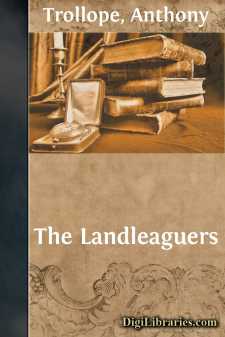Categories
- Antiques & Collectibles 13
- Architecture 36
- Art 48
- Bibles 22
- Biography & Autobiography 813
- Body, Mind & Spirit 142
- Business & Economics 28
- Children's Books 17
- Children's Fiction 14
- Computers 4
- Cooking 94
- Crafts & Hobbies 4
- Drama 346
- Education 46
- Family & Relationships 57
- Fiction 11829
- Games 19
- Gardening 17
- Health & Fitness 34
- History 1377
- House & Home 1
- Humor 147
- Juvenile Fiction 1873
- Juvenile Nonfiction 202
- Language Arts & Disciplines 88
- Law 16
- Literary Collections 686
- Literary Criticism 179
- Mathematics 13
- Medical 41
- Music 40
- Nature 179
- Non-Classifiable 1768
- Performing Arts 7
- Periodicals 1453
- Philosophy 64
- Photography 2
- Poetry 896
- Political Science 203
- Psychology 42
- Reference 154
- Religion 513
- Science 126
- Self-Help 84
- Social Science 81
- Sports & Recreation 34
- Study Aids 3
- Technology & Engineering 59
- Transportation 23
- Travel 463
- True Crime 29
Anthony Trollope
Anthony Trollope (1815-1882) was a prolific English novelist best known for his series of novels set in the fictional county of Barsetshire, including "Barchester Towers" and "The Last Chronicle of Barset." His works, often exploring the intricacies of Victorian society and politics, feature complex characters and detailed social commentary. Trollope also had a notable career in the British postal service, where he is credited with introducing the red pillar box (mailbox).
Author's Books:
Sort by:
by:
Anthony Trollope
MR. JONES OF CASTLE MORONY. In the year 1850 the two estates of Ballintubber and Morony were sold to Mr. Philip Jones, under the Estates Court, which had then been established. They had been the property of two different owners, but lay conveniently so as to make one possession for one proprietor. They were in the County Galway, and lay to the right and left of the road which runs down from the...
more...
by:
Anthony Trollope
CHAPTER I. THE BARONY OF DESMOND. I wonder whether the novel-reading world—that part of it, at least, which may honour my pages—will be offended if I lay the plot of this story in Ireland! That there is a strong feeling against things Irish it is impossible to deny. Irish servants need not apply; Irish acquaintances are treated with limited confidence; Irish cousins are regarded as being...
more...
by:
Anthony Trollope
CECILIA HOLT AND HER THREE FRIENDS. There came an episode in the life of Cecilia Holt which it is essential should first be told. When she was twenty-two years old she was living with her mother at Exeter. Mrs. Holt was a widow with comfortable means,—ample that is for herself and her daughter to supply them with all required by provincial comfort and provincial fashion. They had a house without...
more...
by:
Anthony Trollope
CHAPTER I Dr. Finn, of Killaloe, in county Clare, was as well known in those parts,—the confines, that is, of the counties Clare, Limerick, Tipperary, and Galway,—as was the bishop himself who lived in the same town, and was as much respected. Many said that the doctor was the richer man of the two, and the practice of his profession was extended over almost as wide a district. Indeed the bishop...
more...
by:
Anthony Trollope
CHAPTER I No one, probably, ever felt himself to be more alone in the world than our old friend, the Duke of Omnium, when the Duchess died. When this sad event happened he had ceased to be Prime Minister. During the first nine months after he had left office he and the Duchess remained in England. Then they had gone abroad, taking with them their three children. The eldest, Lord Silverbridge, had been...
more...
by:
Anthony Trollope
CHAPTER I. BIOGRAPHICAL. In the foregoing volumes of this series of English Men of Letters, and in other works of a similar nature which have appeared lately as to the Ancient Classics and Foreign Classics, biography has naturally been, if not the leading, at any rate a considerable element. The desire is common to all readers to know not only what a great writer has written, but also of what nature...
more...
by:
Anthony Trollope
THE MAN WHO HUNTS AND DOESN'T LIKE IT. It seems to be odd, at first sight, that there should be any such men as these; but their name and number is legion. If we were to deduct from the hunting-crowd farmers, and others who hunt because hunting is brought to their door, of the remainder we should find that the "men who don't like it" have the preponderance. It is pretty much the same,...
more...
by:
Anthony Trollope
CHAPTER I In the latter days of July in the year 185––, a most important question was for ten days hourly asked in the cathedral city of Barchester, and answered every hour in various ways—Who was to be the new bishop? The death of old Dr. Grantly, who had for many years filled that chair with meek authority, took place exactly as the ministry of Lord –––– was going to give place to that...
more...
by:
Anthony Trollope
Ferdinand Lopez It is certainly of service to a man to know who were his grandfathers and who were his grandmothers if he entertain an ambition to move in the upper circles of society, and also of service to be able to speak of them as of persons who were themselves somebodies in their time. No doubt we all entertain great respect for those who by their own energies have raised themselves in the...
more...
by:
Anthony Trollope
CHAPTER I. DR. WORTLE. The Rev. Jeffrey Wortle, D.D., was a man much esteemed by others,—and by himself. He combined two professions, in both of which he had been successful,—had been, and continued to be, at the time in which we speak of him. I will introduce him to the reader in the present tense as Rector of Bowick, and proprietor and head-master of the school established in the village of...
more...











